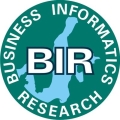
BIR 2015
14th International Conference on Perspectives in Business Informatics Research
26-28.August, 2015, Tartu, Estonia
Post-Conference information:
Keynotes:
Proceedings:
The mission of the BIR conference series is to foster highly inter-disciplinary research in the field of business informatics, particularly research that bridges across management and engineering aspects and that strikes a balance between scientific rigor and practical relevance and applicability.
The BIR 2015 conference is the fourteenth in the conference series. This year the conference is hosted by the Institute of Computer Science of University of Tartu.
In addition to a research, work-in-progress and industry paper sessions, BIR'2015 will feature a doctoral consortium and workshops aimed at attracting work-in-progress research in focused emerging topic areas.
THEME
Information and Communication Technology (ICT) plays an increasingly important role in organizations, inter-organizational networks, society and individuals' daily life. Business activities are dependent on software systems operating in dynamic and often unpredictably changing business environments. In this setting, the theme for BIR 2015 conference is "making business information systems interoperable and adaptive in highly interconnected and changing contexts".
The conference solicits papers on all aspects of business informatics research with a special emphasis on the theme of interoperability and adaptation. The conference accepts original contributions of the following types: full research papers, research-in-progress papers, industrial papers (see the paper submission instructions).
TOPICS
- Business, people and systems interoperability
- Philosophical and social perspectives of interoperability
- Ontological foundations of Business Informatics
- Systems theory and principles
- Conceptual modelling
- Human oriented systems
- Emerging technologies and paradigms
- Methods, architectures and communication technologies supporting interoperability
- Enterprise modelling and virtual organisations
- ERP, CRM and SCM systems
- e-commerce, e-business, e-government,
- Future trends
- Business and information systems development
- Requirements Engineering
- IS modelling
- Business Process Management
- Business Rules Management
- Decision Modeling and Management
- Service Oriented Architecture
- Model Driven Architecture (MDA)
- Unified Modelling Language (UML)
- Agile information systems development
- IS quality management
- IS security
- Business intelligence
- Data warehousing
- Descriptive, predictive and prescriptive business analytics
- Decision support systems
- Business process mining
- Knowledge Management and Semantic Web
- Knowledge management in interconnected world
- Semantic Web methods and languages
- Ontology modelling languages and tools
- Open innovation
- Ontology applications in business
- E-learning and learning organisations
- Open source, open innovation and open society
- Open source development and deployment tools
- Interoperability of open source communities
- Integrating open source technology with commercial and proprietary products
- Open innovation
- Open source solutions for model driven development
- Web and social computing
- Contextualized evaluation of business informatics
- Feasibility of existing techniques and languages
- Contextualized value and quality
- User acceptance of new technology
- Curriculum design and implementation issues
- Case studies and experience reports
- Project management issues
- Risk management issues




